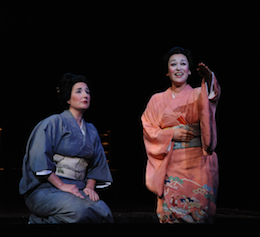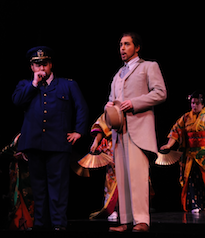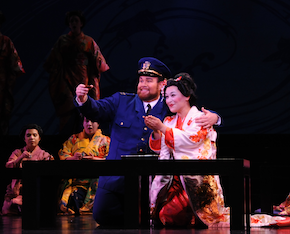
Photos by Pat Kir
Oh that Puccini. If any composer, past or present, understood how to grab hold of your heart and wring you dry of tears, it was the great man from Tuscany. Some critics have disparaged his melodies and orchestration as too obvious, even commonplace, but anyone who makes it out of Opera San José’s double-cast production of Madama Butterfly without a lump in their throat, if not a pocketful of wet hankies, must be too afraid of displaying emotion to fully acknowledge the terrible tragedy at the core of this great work.
It’s not that either Opera San José’s production in the California Theatre, or its alternate cast (reappearing on Feb. 22, 25, and March 2), is perfect. There are many things to quibble about, not the least of which are the static nature of Brad Dalton’s Act 1 staging, conducting by David Rohrbaugh that first begins to take flight at the end of that Act, a set that is much too bare at first, understated makeup by Jeanna Parham that leaves most of the Japanese characters looking like Americans in kimonos, and the fact that B.F. Pinkerton, the U.S. Naval lieutenant who callously takes as his bride 15-year-old geisha Cio-Cio-San (Butterfly), throws enough half smoked cigarettes to the ground to burn down his early 20th-century rice-paper house long before he and his lovely Butterfly consummate their marriage. But once the music gets going in Act 2, it’s hard not to leave critical thoughts behind as Puccini sweeps you away … until, perhaps, the unexpected ending.

On Sunday afternoon, a main reason for the production’s success was the Butterfly of soprano Cecilia Violetta López. One of four resident company leads in the production, López possesses an inherently beautiful, absolutely secure voice that opens on high to reveal the wealth of dramatic, heart-tugging colors ideal for her role. Equally vital was her believability as a naïve yet consistently assertive 15-year-old who gives herself, body and soul, to a callous white man who sets sail the next day, only to return three years later with his white American bride in tow. The sincerity and economy of López’s expression and movement, the remarkable unity of her portrayal, and her ability to taper vibrant high notes to silvery threads are marks of an artist who, as she develops the ability to put a unique stamp on her interpretation, could go far in years ahead.
As Pinkerton, resident tenor James Callon displayed a beautifully produced voiced that rarely gathered energy or momentum, and weakened at the very top. In much of Act 1, he sounded as though he had taken far too much Xanax to fully rise to Puccini’s challenges. Pinkerton may be a skunk, but he’s a skunk with ardor and passion. That we only heard, far too briefly, at the opera’s very end.

As Butterfly’s faithful maid, Suzuki, resident mezzo-soprano Lisa Chavez produced uncommonly rich and luscious tones of considerable power, but failed to deliver the essential sympathy her role requires. I could not help but recall the heartbreaking Suzuki of the late Zheng Cao, whose identification with Cio-Cio-San was so complete as to make the tragedy of the opera nearly unbearable.
The fourth member of the resident company, baritone Zachary Altman, grew increasingly sympathetic as a character, even though he looked far too young to play American consul Sharpless. The beauty of his voice won many an audience member over, even if it wanted for richness and strength on top, and only bit partway into the role.
Tenor Michael Mendelsohn was his usual excellent self as marriage commissioner Goro, and bass Silas Elash and baritone Torlef Borsting were fine in their small roles as Commissioner and Prince Yamadori. Though bass Matthew Anchel was a weak Bonze, mezzo-soprano Carin Gilfry created a far more touching Kate Pinkerton than most. One would of course expect little Sammy Tittle, who played 3-year-old Trouble, to be adorable, which he was, but he also displayed acting abilities that went well beyond the surface.
And then there was the whamo ending. Let’s just say that our cowardly Lt. had to deal with far more than remorse, and his mostly silent American wife managed to say more about herself and her surprising strength of character than any other Kate Pinkerton I’ve encountered.
Whether I liked the ending is beside the point. What mattered most were the glory and grandness of Puccini, and the heart-rending Butterfly of Cecilia Violetta López. While ever-appreciative Bay Area audiences tend to give standing ovations to most leading artists, Opera San José’s displayed uncommon discernment by waiting until López emerged toward the end of the curtain calls to rapidly rise and cheer her wonderful performance.

